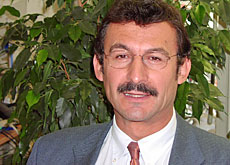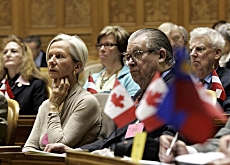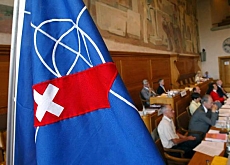Mr Fix-it solves problems of the Swiss abroad

Markus Börlin, the new head of the foreign ministry department for Swiss citizens abroad, talks to swissinfo about life on the crisis management frontline.
Whether handling major crises or simple issues affecting Swiss nationals overseas, there’s never a dull moment in Börlin’s working day.
Börlin, who took over the department at the end of May, explains why helping Swiss citizens who run into trouble abroad is always a matter for the state to deal with.
swissinfo: You lived abroad for many years. What was your perception of Switzerland during that time?
Markus Börlin: The most interesting thing when living abroad is always how your perspective changes. Obviously it alters much more if you live abroad longer.
As happened to me in Africa, small things, which might annoy you when in Switzerland, can seem completely different and insignificant when abroad.
On the other hand, it’s quite natural for your image of the foreign country where you are living to change too. It’s always interesting when your ideas are challenged and your pre-conceived image of the host nation is altered by your new reality and the image of your homeland.
swissinfo: Since the end of May you have been head of the department responsible for Swiss abroad, where you worked previously. What have been your most memorable experiences?
M.B.: Between 2000 and 2004, when I worked here, and since May 2006, it’s been extremely eventful. I was in charge of helping Swiss people in New York following the September 11, 2001 attacks on the World Trade Center. I was also responsible for providing support during the 2003 Sahara hostage taking, as well as the tsunami disaster and now Lebanon, where we recently helped more than 900 Swiss nationals and family members to leave the country.
The major crises were very dramatic. But some of the many smaller incidents, which fail to make the papers because they only affect a handful of people, are equally as memorable. And for those concerned, the suffering can be just as bad.
But like the fire brigade or the police, it’s always important to maintain a professional distance. We’re responsible for solving problems not just showing sympathy.
swissinfo: More and more Swiss people travel or live abroad. Given the number of conflicts and terrorism threats, does this mean that you are much busier?
M.B.: Not necessarily. We’re busier due to growing dangers or the complexity of risks than the actual number of Swiss abroad.
Also, technically we have become much more interconnected and many problems are now easier to solve. Swiss citizens travelling abroad rely less on consular protection.
For us it means we have to deal with the more difficult, complex cases. From this point of view, we certainly have more work.
swissinfo: Although more Swiss citizens are settling abroad, consulates are being closed. Does this make sense?
M.B.: It has to be looked at from a much wider perspective. The number of consulates is dependent on resources available. That’s a political decision.
In such circumstances, we are obliged to constantly analyse and weigh up the needs while defending Switzerland’s interests.
Do we want an embassy? Do we still need this consulate? In this country, which is increasingly important for Switzerland, shouldn’t we open a mission?
Obviously there is greater need for support in emerging or developing countries than in neighbouring European countries, for example.
The decision to move resources around is completely justifiable.
swissinfo: You mentioned the Sahara hostage-taking incident. How far is the state responsible for its citizens’ well-being abroad, and where does individual responsibility begin?
M.B.: That’s a political question. It was discussed with respect to the hostage taking but was not an issue during the Lebanon crisis, where the Swiss people and politicians agreed that, through no fault of their own, Swiss citizens were caught by surprise and should expect our full support.
In Switzerland, if you call the police or fire brigade to rescue someone in an emergency, you don’t ask questions about individual responsibility. You just help – that’s the state’s duty.
Our travel advice is intended to highlight possible dangers such as terrorist attacks in certain regions. The final decision lies with the individual, though. The state shouldn’t patronise. It should help with risk assessments and decision-making.
It’s also about not playing into terrorists’ hands. If, out of principle, we were to dissuade people from travelling to a country following a terrorist attack, the terrorists would achieve their aims.
swissinfo: What are the main problems you have to deal with in your daily work?
M.B.: This summer it’s been the Lebanon crisis. Then there are natural disasters, political crises or terrorist attacks that can occur anytime anywhere in the world.
You never know when or where something might happen. And every crisis is always different and never routine.
swissinfo-interview: Gaby Ochsenbein
The foreign ministry’s department for Swiss citizens abroad was established in the 1940s.
Since 1999 it has belonged to the Political Department VI.
It oversees policies for Swiss citizens abroad, consular protection and is active during major crises.
It is responsible for information for Swiss citizens abroad. It also generates statistics regarding Swiss abroad and is represented on various bodies for Swiss overseas.
At the end of 2005, 634,216 Swiss citizens were officially living abroad.
This represents an increase of 11,159 since 2004.
395,397 Swiss live in Europe.
18,107 live in Africa.
163,122 live in the United States.
30,451 live in Asia.
27,229 live in Oceania.
Since 1992 Swiss citizens living abroad can vote in Swiss elections.
Markus Börlin was born in Basel in 1960
He studied law in Basel.
1990: Started to work at the foreign ministry
1997: First assistant to the head of the Swiss mission in Nairobi, Kenya
1999: Promotion to counsellor
2000: Head of the special crisis taskforce
2004. Counsellor and first assistant to the head of the Swiss mission in Stockholm, Sweden
May 2006: Head of the Political Department VI, Swiss citizens abroad at the foreign ministry

In compliance with the JTI standards
More: SWI swissinfo.ch certified by the Journalism Trust Initiative




You can find an overview of ongoing debates with our journalists here. Please join us!
If you want to start a conversation about a topic raised in this article or want to report factual errors, email us at english@swissinfo.ch.